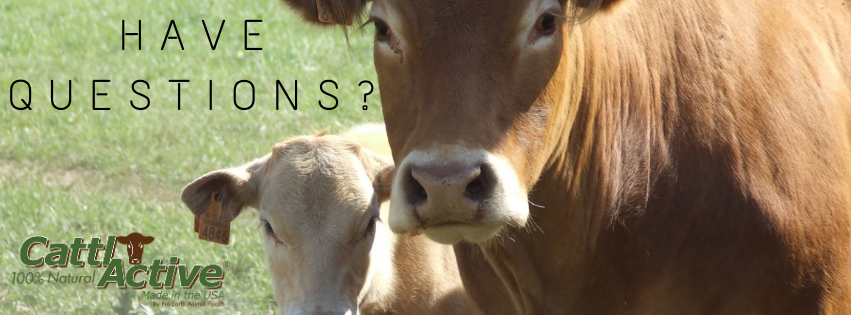Featured

Below are answers to some of the most common questions we receive. Please also watch the video for a quick overview of CattlActive®.
If you have specific inquiries that aren’t answered below, please feel free to reach out to us using the form at the bottom of this page. One of our CattlActive® Specialists will get right back to you with the answers you’re seeking.
How does CattlActive® work?
CattlActive® is an all-natural supplement containing a proprietary selection of plant extracts. It acts as a prebiotic, creating an environment that supports the growth and maintenance of beneficial rumen microbes. These microbes are essential for the proper digestion and conversion of feedstuffs into useable, easily absorbed nutrients. The health of cattle depends heavily on the state of the rumen, which includes a neutral pH and strong microbial colonies to support the health, productivity and growth of calves or cows.
What are the benefits of using CattlActive®?
Here are just a few benefits of using CattlActive®:
- Supports a neutral rumen environment for the growth and proliferation of beneficial microbial populations
- Helps rumen microbes maintain a strong immune system
- Encourages feed and water consumption, even during stressful events such as weather extremes and branding
- Available in several forms, including liquid, tubs and pellet/granular to address the needs of any operation
Can CattlActive® be used in all cattle?
CattlActive® is made with all-natural ingredients and is completely safe for use in all cattle, from newborn calves to pregnant cows to breeding stock and beef animals.
Can CattlActive® be used in animals intended for human consumption?
Yes, CattlActive® is safe for use in animals being raised for food. It has no exit period and contains no drugs.
Does CattlActive® contain probiotics?
CattlActive® does not contain probiotics. Instead, it is a prebiotic, meaning it supports the growth and health of the beneficial microbes living in the rumen. A low pH can lead to die-off of the “good” microbes, which is why a prebiotic that supports a neutral environment is so integral to the ongoing health and reproduction of rumen microbes.
What are prebiotics?
Prebiotics are feed ingredients that are partially digestible or not digestible at all. They serve as nutrition for healthy rumen microbes to flourish. As a result, they support the increase of healthy bacteria and maintain a normal balance of beneficial vs. “bad” microbes in the rumen.
What is heat stress in cattle?
Heat stress occurs when an animal’s heat load becomes greater than its capacity to shed the heat. This condition is also known as hyperthermia. Hyperthermia is common among dairy cattle during the summer months but can also be experienced by beef animals.
Heat stress is caused by:
- The heat of the sun, humidity and high air temperature
- Air temperature that exceeds 100°F and humidity that’s more than 80%
- Poor ventilation in pens or barns that cause the heat radiated by the animals’ bodies to be retained in the environment at night
What causes calf scours?
Calf scours have infectious and noninfectious causes. The infectious causes include:
- Viruses like IBR, BVD, coronavirus and rotavirus
- Bacteria such as salmonella, E. coli and clostridium
- Protozoans like coccidia and cryptosporidium
E. coli is the most common bacterial cause of scours in calves. Calves born in contaminated calving areas or raised in facilities with poor sanitation practices can contract severe scours caused by E. coli within 24 hours after birth.
Non-infectious causes of scours include:
- Poor nutritional management of the cow during gestation, resulting in poor quality or quantity of colostrum being available at birth
- Overcrowded pens or an environment with various stressors, such as extreme cold or heat
- Lack of cow’s attention at birth — if the calf was born through a difficult delivery or it’s too weak to nurse, it is more likely to develop scours within a few hours
What is SARA?
SARA stands for sub-acute ruminal acidosis. It is a metabolic disorder that occurs when the pH level of the rumen is too low (or acidic). While this low pH (less than 5.8) is difficult to detect visually, it can trigger a series of problems including poor feed and water consumption, lethargy, rapid respiratory rate and elevated heart rate.
I am interested in ordering tubs or a large bag of mineral. Why can’t I find them on the site?
Due to the size and weight of the lick tubs, we ask that you call in to the office (1-800-254-0179×1) to order these items. This way, the most economical shipping rate can be calculated for you. Alternatively, check out our Store Finder to find out if a store near you is carrying the tubs and bags.
